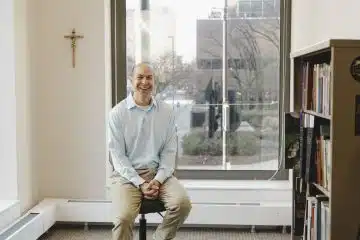The Virtue of Waiting

Imagine if, overnight, every phone, computer and television stopped working: no notifications, no screens, no newsfeed. You can’t even check your email. The next day would feel like a different world, unfamiliar and unnerving. Even if this silence lasted for just 24 hours, what would it be like? Aside from the apocalyptic hysteria, there would probably be a lot of waiting: in grocery lines, in traffic (without music or podcasts), in the kitchen as coffee brews.
Stretch this scenario to a week, a month or indefinitely. Can you picture life stripped of our digital time-fillers? It would likely be frustrating at first, and boring too. But after a month—or perhaps a year—you might notice something surprising: you’d feel better—less stressed, more rested, content with who you are and closer to God.
We live in a unique moment of human history, when waiting, once a common visitor, is almost a stranger. The world of entertainment and distraction sits in your pocket, ready to fill every idle moment. Yet, in those rare pauses when we are left with nothing to do, we stumble upon a sacred opportunity: waiting.
Scripture frequently praises waiting, but its depth often escapes us. In the New Testament, the Greek word makrothymia, translated as “patience” or “long-suffering,” combines makros (“long”) and thymos (“soul” or “heart”). It paints the image of a “long-hearted” person, someone who has the heart to wait for God. This patient waiting lies at the core of the Christian life: “Surely, I wait for the Lord; who bends down to me and hears my cry” (Ps. 40:1).
Waiting is not just letting the time pass, it can be profoundly contemplative. Consider what happens on a silent retreat: the faithful are invited to listen rather than speak, to receive rather than demand. This contemplative silence mirrors the posture of the Virgin Mary, who, when greeted by the angel Gabriel, opened her heart fully to God’s will. Mary’s fiat—“May it be done to me according to your word” (Lk. 1:38)—is the purest expression of contemplation. She does not scheme, argue or demand; she listens, accepts and waits.
Contemplation transforms waiting from a burden into a space for God’s grace to work in us. In this stance of quiet receptivity, we gradually become aware of His eternal presence, hidden behind the usual noise of daily life. By slowing down and waiting, we discover that God is always near, active and guiding us toward joy.
Of course, waiting can be painful, especially when we’re longing for something we know to be good. Many of us wait for marriage, children, healing from illness, meaningful work or simply a time of peace. In these prolonged seasons of uncertainty, we need the long-hearted virtue of hopeful waiting to guard us against despair.
Jesus tells the parable of the ten virgins waiting for the bridegroom (Mt. 25:1-13) to teach us that our deepest spiritual longing—union with God—can only come to those who wait. Salvation does not come from frantic striving or impatient grasping. We cannot storm Heaven by our own efforts. Instead, we gaze upward with steadfast faith, and as we wait, God looks upon us in tender love, giving us all we need to get through our dark nights. Then, when the dawn breaks, we find ourselves renewed, carried upward by a grace that was always there and waiting for us to slow down, be still and trust in God.
 Colin Rahill is the Director of Digital Engagement for the Archdiocese of Cincinnati, as well as an author and speaker. | [email protected]
Colin Rahill is the Director of Digital Engagement for the Archdiocese of Cincinnati, as well as an author and speaker. | [email protected]
This article appeared in the February 2025 edition of The Catholic Telegraph Magazine. For your complimentary subscription, click here













